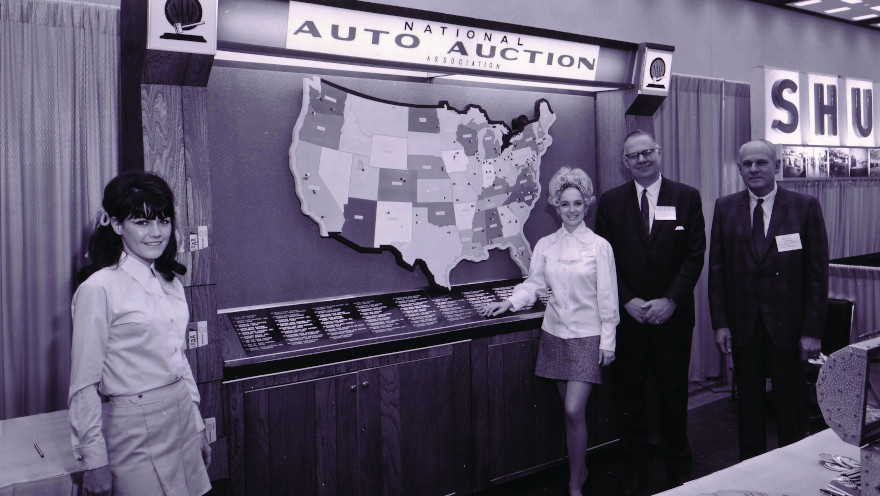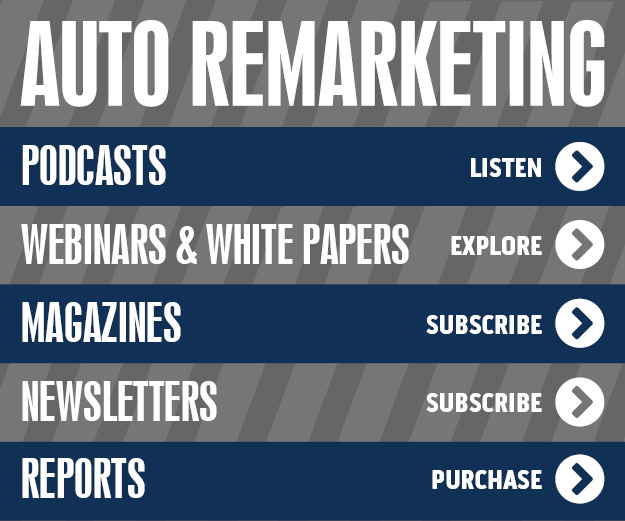NAAA strengthens the auto auction industry through friendships, say longtime members

File photo courtesy of National Auto Auction Association.
Tom Adams got into the auction business straight out of the Navy in 1970. It was a decidedly different time for the auto auction business.
“Auctions back then were independent mom-and-pop businesses. Entire family worked the auction,” said Adams. “Facilities were pretty meager. There was one lane and a carnival kind of atmosphere.”
The association’s auction members’ facilities are now often huge or even online. As the NAAA prepares to celebrate its 75th anniversary, some things remain the same, however.
It is still an organization that brings the disparate auction industry players together to advocate for the industry and forge friendships that strengthen the industry as a whole.
Founded in 1948 as the National Auto Auction Association Protection Association, today’s NAAA is an international private nonprofit serving and representing all segments of the remarketing community. It changed its name to the current National Auto Auction Association in 1954.
Adams owns AutoTec, an NAAA associate member best known for AuctionACCESS, a database of all automobile dealers and other representatives who do business at auto auctions.
AutoTec grew out of a business started by his father to provide insurance to auto auctions. That helped legitimize auctions, said Adams. “Particularly in the 1950’s and 1960’s, for an auction to be able to advertise they were insured” was important, he said.
The NAAA also helped legitimize the auto auction business in the eyes of some important future customers, said Adams.
“Car dealers and financial institutions kind of looked down their nose at the auto auctions as being (kind of a) less credible part of the car business.” he said. “There were lots of car dealers that wouldn’t handle used cars. NAAA did a good job of giving credibility to the auto auction industry.”
The manufacturers’ use of auctions also was a stamp of credibility, said Adams, a 1992 inductee into the NAAA Hall of Fame. Chrysler was the first automaker to use auctions with its “buy-back” sale of rental and company cars via auction in 1973.
New- and used-car dealers, manufacturers, fleet operators, companies, and financial institutions now buy and sell at NAAA member auctions worldwide.
The association’s current membership includes more than 348 domestic and international auctions with combined 2022 sales of 6.6 million vehicles and wholesale revenue of more than $110 billion as well as 139 associate members, which include state organizations, suppliers, remarketers and others serving the auto auction industry.
Events such as the annual NAAA World Remarketing Convention provide a space for members and associate members to meet and mingle, renewing acquaintances and making new industry friends. This year’s convention is in Chicago, Sept. 26- 28.
The atmosphere has changed quite a bit since the first conventions, said Adams. AutoTec was the first sponsor of the annual convention.
“Our business and the association’s business grew up together,” he said
Early conventions were more like “a lot of fun,” said Adams, and were held in locations including Bermuda and London.
“It was a family-oriented business. (The convention) became a long weekend vacation, an opportunity to see others in the industry and develop friendships,” said Adams.
AutoTec sponsored a gold tournament during the convention for a while. “As meetings became more about business, we moved on,” said Adams.
Developing friendships is still one of the most important benefits of NAAA membership, however, said Ray Nichols, chairman and CEO of BSC America, which owns auctions in Florida and Maryland.
BSC became a NAAA member when his family acquired Bel Air Auto Auction in 1980, says Nichols, a former banker. The Bel Air auction was already a member under the previous owner.
Ray Nichols is a past president of NAAA. His son R. Charles Nichols also is a past president and is the current chairman of the board.
The auction business is truly a family affair for the Nichols.
R. Charles Nichols, is BSC president, his daughter Michelle Nichols-Neff is executive vice president, and a grandson just joined the business, as well, said Ray Nichols.
The friendships formed through NAAA allow a group of competitors to work together for the better of the auto auction industry, he said.
“At the meetings it is a lot of camaraderie and a lot of good work for the industry,” he said. “It has been a truly major effort on the part of NAAA members to work for the benefit of the whole.”
For example, BSC worked with other NAAA members to develop AuctionNet, “the largest and most comprehensive wholesale used vehicle sales data base in the U.S.,” according to the NAAA website.
AuctionNet is emblematic not only of the benefit of the camaraderie the NAAA creates, but also the technological changes the auction business is going through.
In the early auction days, long before his family acquired Bel Air Auto Auction, a single car would run through the lane of a former livestock auction. The dealers would pay the auction a small fee and would individually exchange the title, said Nichols.
“There was hardly any paperwork,” he said.
There isn’t much paperwork today, either, because it’s all done digitally. The biggest advancement he has seen in the auto auction business, said Nichols, is Manheim’s Simulcast platform, which allows buyers and seller to participate in auctions in real time online.
Nichols expects the auction industry to continue to expand such ground-breaking services.
“We are the stock market of the car and truck industry,” he said.
The NAAA will continue to help its members evolve along with the industry. At this year’s Chicago convention, for example, there are sessions on the EV market and on EV safety best practices.
There’s also bound to be some talk of the continuing consolidation of the auto auction business. Not just giants like Manheim, said Adams, but also smaller auction chains started by private equity firms that are looking to acquire smaller auctions.
He expects online sales to continue to grow though if demand for used vehicles slows there is some advantage to selling in the physical lane, said Adams.
Regardless of the changes ahead, the NAAA will be there for its members, said Nichols.
“It’s the friendships and the cooperation that always impresses me,” he said. “That strong competitors can get together at the NAAA and work really hard for everybody. I’ve seen that in some really tough situations that have come out really positively.”

 View The Latest Edition
View The Latest Edition

